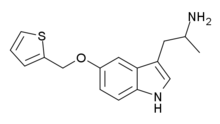- ↑ Li Q, Cheng T, Wang Y, Bryant SH (2010). „PubChem as a public resource for drug discovery.”. Drug Discov Today 15 (23-24): 1052-7. DOI:10.1016/j.drudis.2010.10.003. PMID 20970519. edit
- ↑ Evan E. Bolton, Yanli Wang, Paul A. Thiessen, Stephen H. Bryant (2008). „Chapter 12 PubChem: Integrated Platform of Small Molecules and Biological Activities”. Annual Reports in Computational Chemistry 4: 217-241. DOI:10.1016/S1574-1400(08)00012-1.
- ↑ Kennett GA, Bright F, Trail B, Baxter GS, Blackburn TP (April 1996). „Effects of the 5-HT2B receptor agonist, BW 723C86, on three rat models of anxiety”. British journal of pharmacology 117 (7): 1443–8. PMC 1909458. PMID 8730737.
- ↑ Kennett G, Trail B, Bright F (December 1998). „Anxiolytic-like actions of BW 723C86 in the rat Vogel conflict test are 5-HT2B receptor mediated”. Neuropharmacology 37 (12): 1603. DOI:10.1016/S0028-3908(98)00115-4. PMID 9886683.
- ↑ Knowles Ian D, Ramage Andrew G (January 2000). „Evidence that activation of central 5-HT2Breceptors causes renal sympathoexcitation in anaesthetized rats”. British Journal of Pharmacology 129 (1): 177. DOI:10.1038/sj.bjp.0703011. PMC 1621132. PMID 10694218.
- ↑ G�nther Silke, Maroteaux Luc, Schwarzacher Stephan W. (August 2006). „Endogenous 5-HT2B receptor activation regulates neonatal respiratory activityin vitro”. Journal of Neurobiology 66 (9): 949. DOI:10.1002/neu.20253. PMID 16758492.
- ↑ Ryan B, Anwyl R, Rowan M (August 2008). „5-HT2 receptor-mediated reversal of the inhibition of hippocampal long-term potentiation by acute inescapable stress”. Neuropharmacology 55 (2): 175. DOI:10.1016/j.neuropharm.2008.05.006. PMID 18538800.
Spoljašnje veze
uredi
